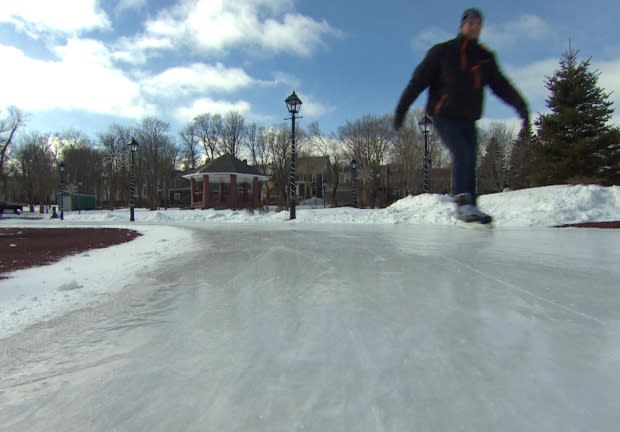Here's how to stay warm during this cold snap
It's cold in Newfoundland today. Dang cold.
Environment Canada has issued an extreme cold warning for the whole island due to "a prolonged period of very cold wind chills," which began last night and will continue into Thursday morning.
With the wind chill, it's feeling as cold as anywhere from –25 to –35 in most parts of the island, and Environment Canada is warning people to cover up, because frostbite can develop within minutes on exposed skin. Conditions are expected to improve Thursday as temperatures rise and the winds die down.

The streets of St. John's were mostly empty earlier in the day, with a lone walker around the Quidi Vidi trail at one point mid-morning and just a single family enjoying a skate at Bannerman Park.
"Here we are! Minus 13!" exclaimed a cheery Juanita Bragg, who said her nylon long johns were keeping out most of the chill. "That's nothing. We're Newfoundlanders."
While some CBC reporters weren't overjoyed to be outside, it didn't seem to faze Bill and Annie Davis, sauntering into the Avalon Mall while everyone else scurried past.
They've spent more than a decade living in Fort McMurray, Alta.
"One week ago I came from -47," Annie Davis said. "The plane even froze up."
The pair had some advice for their home province: get a good, thick scarf that can cover everything but your eyes.
"Keep your skin covered, because it will freeze very fast."
Okay, but what if I hate this weather?
Not used to the cold? Looking to keep yourself, and your home, warm when the temperature plummets?

CBC N.L.'s got you covered.
Frozen pipes? Use a blow-dryer, not a blowtorch
Corner Brook deputy fire chief Craig Harnum says when pipes freeze up, people understandably want them thawed out immediately.

"Our biggest fear is the way you're going to do it," he said.
"Everybody's quick shot is to go grab the blowtorch, and we're saying please don't do that, because even though it don't catch fire at the moment, you have a possibility of leaving embers, smouldering material, which later turns into a structure fire."
Use something that doesn't have an open flame instead, like a heat gun or a blow-dryer.
Have the right outdoor gear
Michelle Wells, a safety adviser who teaches first aid to staff with telecommunications company PhoneTech, says her first thought goes to technicians who do a lot of work outdoors for long periods of time. People who need to be outside during extremely cold weather need to make sure to cover up, she said.
"The most important thing that they need is to cover up everything, every part of their body," she said. "Like their nose, their fingertips, their toes. It's very important that they're covered up."

And warm-up breaks are crucial, she said. With a frostbite warning in effect, it's important to get indoors briefly to thaw out rather than spending extended time outside.
Dress in layers. The more layers, the more you're able to adjust to the weather by adding or removing a layer of clothing.
Mitts are better than gloves
Mitts will keep your hands warmer than gloves will, said Wells, because gloves separate the fingers.
"When you have gloves on, your fingers get colder quicker."
Workers, trust your instincts
People who regularly work outdoors have a good sense of when it's simply too cold to be working, said Wells.

"If you feel that it's too cold to work out in this cold weather, you have the right to stop working," she said.
Give space heaters space
Keep space heaters well away from anything flammable, says Harnum. That's a rule for anything that provides heat — keep the area around things space heaters, wood stoves, etc., nice and clear. And don't push appliances past their limits.
"People are going to want to stay warm, but please do it safely. Extra blankets are probably the answer," he said.
Read more articles from CBC Newfoundland and Labrador

